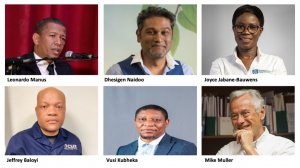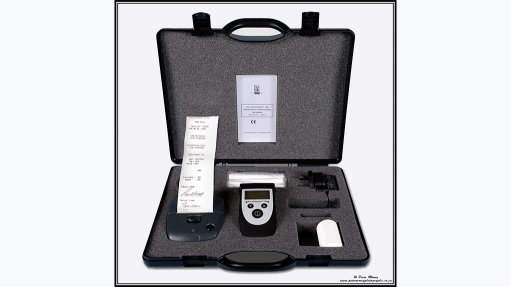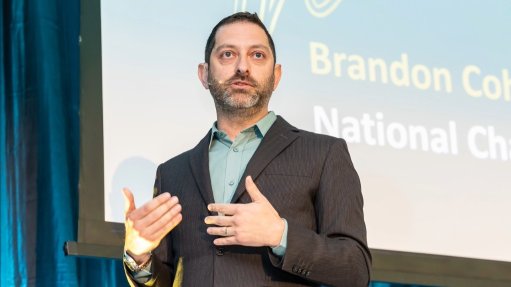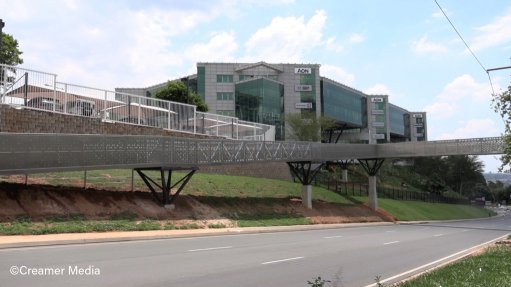Water challenges a consequence of a multitude of external issues
While South Africa’s water sector challenges are vast, and longstanding, many external factors are impacting on the country’s ability to provide reliable clean quality water to all its citizens.
This is according to a panel participating in a Creamer Media-hosted webinar titled ‘Water: Challenges in water infrastructure and treatment’, held on March 29, which was facilitated by Institute for Security Studies African Climate Risk and Human Security Programme head Dhesigen Naidoo.
Panellists included University of the Witwatersrand School of Governance visiting adjunct professor Mike Muller, Department of Water and Sanitation (DWS) acting deputy director-general for infrastructure management Leonardo Manus, Protea Chemicals Watercare Solutions GM Joyce Jabane-Bauwens, Council for Scientific and Industrial Research (CSIR) Water Centre senior researcher and chemical engineer for Smart Places Dr Jeffrey Baloyi and Rand Water chief strategy officer Vusi Kubheka.
The panellists agreed that it was time to shift the view that South Africa had a water crisis and that only climate change was to blame.
“I think that changing the nature of the discussion around water being part of some of the challenges, but also a victim of many other challenges inside the system, [is required],” said Naidoo in response to Muller's comments that the country faced a range of challenges impacting its water supply.
While Muller reaffirmed that the challenges the country was facing did not amount to a water crisis as such, he acknowledged, however, that many citizens were concerned that it did when taps run dry, sometimes for days or weeks at a time.
“We have a whole range of problems involving water, and they start at the sort of level of the globe, with the climate issues, and they go all the way down to the household where we open the tap in the morning and the water does not come in.
“Unless we really try and understand what the problem is, at what level and who is responsible for it, it is actually quite difficult to have a discussion.”
Muller highlighted a number of challenges facing the sector, including a management problem, largely in the power sector when loadshedding or power outages disabled the water pumps feeding households from reservoirs.
Further, problems at a municipal level are leading to the recurrent failure of water supply, while in terms of areas with persistent drought, in some cases, it is a planning issue.
Further, areas that are suffering from drought, in some cases, have had viable alternatives to feed in water from rivers, as opposed to from depleting dams, but have not implemented the planning already in place and the proposed infrastructure required to action this.
“We have no water problem, but there are issues around the water that will lead to water problems,” Kubheka commented.
“There are many factors that are influencing the situation; factors like climate change, where a heatwave in October last year forced demand to accelerate, but there are also the challenges of the power supply problems that emanate from Eskom, impacting on [cities'] power [utilities], and subsequently infrastructure functions,” he added.
He further pointed to vandalism, and theft of cables, which also had an impact on supply, which was exacerbated by a lack of sufficient storage for water in the municipal areas.
“We are planning together with the municipalities. We are investing a lot of money into new infrastructure to try and accommodate our customers [municipalities] by encouraging them to invest in their own areas. We are also looking at creative ways of actually coming into the municipal space and helping them from a value chain management and reticulation point of view.”
Muller added that there had been many discussions about the ability of municipalities to provide reliable services and the failings at local government level.
“If we are honest, it is the poor who really get poor services, as they live in poor, largely rural municipalities, which are just unable to provide a decent service,” explained Muller.
“I do understand that there is discussion about how to reorganise the institutions so that, where municipalities fail to provide, someone who can do it can get on with the job,” he continued, noting that that approach would immediately transform quite a few of the challenges, particularly in the peripheral rural areas and small towns.
Manus noted that when implementing Section 63 of the Water Services Act, which empowered the Water and Sanitation Minister to intervene as part of the DWS’s mitigation efforts in serious situations, there were major shortcomings.
In one case, for example, the Minister brought in permanent members to take over responsibility for the municipality’s water services component; however, many functions were intertwined, which brought about challenges to the success of the Section 63 intervention.
“However, it is not an opportunity lost, but rather it is an opportunity that helped us to actually shape new processes and new strategies in terms of how would you go in when you want to actually get municipalities to be accountable. We have to come to the point we will also have to enable them to really take their role.”
“We do not have to research the problem, because I think it is well researched as far as the water sector is concerned. It is a solution that we have to find and we have to be quite sure that what we are implementing will be sustainable,” he continued.
However, Manus gave credit to current Water and Sanitation Minister Senzo Mchunu for understanding the scope of business very well in terms of the problem statement.
“There is not an opportunity going amiss whenever he meets with a management officer or department, where he [does not] stress the point that he wants solutions that are workable and sustainable beyond his tenure within the department, to actually see that South Africa benefits from the transformation required within the water services sector.”
Jabane-Bauwens noted that, without water, there was no growth, and that every industry that impacted life had to come up with solutions because a governance problem was everybody's problem.
“The strategy is to provide solutions that enable our customers, including Rand Water and the various water boards, to actually produce that quality water that every human needs, enable industries to recover the scarce resource and also innovate to find solutions . . . that will enable sustainable management and to offer customers clean and quality water and effective sanitation.”
Some of the issues also include nonrevenue water, the level of integrity of the reticulation system, leaks, poor billing and collection systems, all of which are cumulatively contributing to South Africa’s water insecurity.
“It is clear that our challenges are immense. It is clear that the way we have been doing things for decades, maybe even centuries is not the right way to go forward. There are many technological solutions and innovations that we need to embrace,” Naidoo said.
“People would argue that we are managing twenty-first-century water with twentieth-century technology and nineteenth-century operating rooms.”
Baloyi highlighted the extensive work being done by the CSIR, some of which included smart water use and smart water and wastewater infrastructure, followed by smart water analytics and solutions.
“We focus on that and trying to come with solutions in wastewater works and make sure that we have an economy that is not hindered by water shortages.”
Article Enquiry
Email Article
Save Article
Feedback
To advertise email advertising@creamermedia.co.za or click here
Comments
Press Office
Announcements
What's On
Subscribe to improve your user experience...
Option 1 (equivalent of R125 a month):
Receive a weekly copy of Creamer Media's Engineering News & Mining Weekly magazine
(print copy for those in South Africa and e-magazine for those outside of South Africa)
Receive daily email newsletters
Access to full search results
Access archive of magazine back copies
Access to Projects in Progress
Access to ONE Research Report of your choice in PDF format
Option 2 (equivalent of R375 a month):
All benefits from Option 1
PLUS
Access to Creamer Media's Research Channel Africa for ALL Research Reports, in PDF format, on various industrial and mining sectors
including Electricity; Water; Energy Transition; Hydrogen; Roads, Rail and Ports; Coal; Gold; Platinum; Battery Metals; etc.
Already a subscriber?
Forgotten your password?
Receive weekly copy of Creamer Media's Engineering News & Mining Weekly magazine (print copy for those in South Africa and e-magazine for those outside of South Africa)
➕
Recieve daily email newsletters
➕
Access to full search results
➕
Access archive of magazine back copies
➕
Access to Projects in Progress
➕
Access to ONE Research Report of your choice in PDF format
RESEARCH CHANNEL AFRICA
R4500 (equivalent of R375 a month)
SUBSCRIBEAll benefits from Option 1
➕
Access to Creamer Media's Research Channel Africa for ALL Research Reports on various industrial and mining sectors, in PDF format, including on:
Electricity
➕
Water
➕
Energy Transition
➕
Hydrogen
➕
Roads, Rail and Ports
➕
Coal
➕
Gold
➕
Platinum
➕
Battery Metals
➕
etc.
Receive all benefits from Option 1 or Option 2 delivered to numerous people at your company
➕
Multiple User names and Passwords for simultaneous log-ins
➕
Intranet integration access to all in your organisation
















